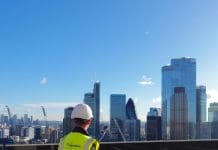Supply chain disruptions, material price inflation and a shortage of skilled labour are key areas of concern in Q3 2021, according to RICS latest survey
RICS reports supply chain disruption, material price inflation and a shortage of skilled labour are key areas of concern in Q3 2021, which could threaten strong workloads led by new infrastructure schemes across the UK.
The Royal Institution of Chartered Surveyors (RICS) survey is conducted by experts and professionals working in the construction sector.
Quarterly breakdown
- Whilst the pace of total activity slipped slightly from +38% in Q2 to +33% in Q3, respondents are reporting strong levels of construction work, which is mostly led by infrastructure projects (+47% in Q3 from +45% in Q2) – with energy, roads and water revealing the strongest outputs.
- Forward-looking indicators point to the sector continuing to experience strong growth over the course of the next twelve months.
- Private and commercial showed the slowest uplift in activity, but the +19% net balance indicates that even this area is seeing business improve and projects resume.
- The availability of construction materials was the biggest challenge cited amongst respondents as supply chains across the UK struggled to re-establish themselves post-Brexit and the pandemic.
- In the final quarter of 2019, just 14% of respondents indicated that this was an issue for them. Fast forward to Q2 2021 and it had jumped to over half of all respondents identifying this issue and, since then, it has continued the rise.
- These results also show that 89% of contributors believe this to be a problem, which is the highest proportion since the survey began in 2012.
Skills shortages
Alongside materials, there are increasing concerns about being able to source sufficient people with necessary construction skills.
In the latest survey, labour shortages were cited by over 80% of respondents which compares with two-thirds in Q2 2021 and 42% in the first three months of the year.
Respondents said bricklayers appear the standout problem with 69% of contributors drawing attention to shortages of this particular skill but carpenters, plasters, electricians and plumbers are not far behind.
Business enquiries remained firm in the third quarter (+40%) which is consistent with the upbeat expectations for activity into 2022, and while the headline workload expectations metric slipped slightly from Q2 at +44%, it remains indicative of a firmly positive trend.
There were fewer positive expectations around profits recovering amongst construction firms given the increases in material prices across the sector.
Tender prices are projected to increase by close to 5% over the period, with materials costs viewed as likely to rise by around 8% – posing a headache for construction firms as this could make the delivery of some projects unviable.
Sustainability practises
With the COP26 conference currently underway in Glasgow, respondents reported a reluctance amongst investors to adopt green building designs or carbon neutral construction practices.
Around 22% said they’d seen no shift in support and nearly 40% saying only niche investors had shown an interest in building more sustainably.
Added to this, 56% of respondents confirmed that biodiversity was not taken into account at all or in fewer than half of the schemes on their books – painting a challenging picture that the construction sector is playing catch-up with wider concerns around sustainability and the impact of climate change.
‘Increasing challenges around sourcing key building materials and skilled labour’
Simon Rubinsohn, RICS chief economist, said: “Activity remains strong in the construction sector with infrastructure projects, including the Thames Tideway Tunnel, Hinkley Point C and HS2, continuing to drive momentum alongside residential developments.
“However the feedback from respondents to the survey is unsurprisingly now also highlighting increasing challenges around sourcing key building materials and skilled labour.
“The impact of these trends on costs is expected to continue through the coming year and is reflected in a mixed picture around the likely improvement in profitability accompanying the broader recovery in the sector.
“The responses to the survey also identify ongoing issues around moving the industry towards adopting more sustainable practices in the week of COP26.
“The inference of the insight provided to us is more needs to be done to encourage the industry to transition from the current approach to the embedding of more carbon neutral techniques in the build processes, something RICS is working with others in the sector to change, which includes developing a new carbon emissions database as well as a carbon reporting framework through the new International Cost Management Standard.”













